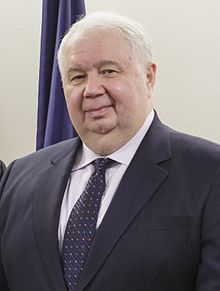Sergey I. Kislyak
| Sergey Kislyak | |
|---|---|

Kislyak in December 2016
|
|
| Senator from Mordovia | |
|
Assumed office 20 September 2017 |
|
| Preceded by | Nikolay Petrushkin |
| Russian Ambassador to the United States | |
|
In office 26 July 2008 – 21 August 2017 |
|
| President |
Dmitry Medvedev Vladimir Putin |
| Preceded by | Yuri Ushakov |
| Succeeded by | Anatoly Antonov |
| Deputy Minister of Foreign Affairs | |
|
In office 2003–2008 |
|
| President | Vladimir Putin Dmitry Medvedev |
| Minister |
Igor Ivanov Sergey Lavrov |
| Russian Ambassador to Belgium | |
|
In office 25 February 1998 – 28 May 2003 |
|
| President | Boris Yeltsin |
| Preceded by | Vitaly Churkin |
| Succeeded by | Yury Alekseyevich Glukhov |
| Personal details | |
| Born |
Sergey Ivanovich Kislyak Сергей Иванович Кисляк 7 September 1950 Moscow, Soviet Union |
| Nationality | Russian |
| Children | 1 |
| Alma mater | Moscow Engineering Physics Institute |
Sergey Ivanovich Kislyak (Russian: Серге́й Ива́нович Кисля́к; IPA: [sʲɪrˈɡʲej ɪˈvanəvʲɪtɕ kʲɪˈslʲak]; born 7 September 1950) is a Russian senior diplomat and politician. Senator from Mordovia from 2017. Previously he served as the Ambassador of Russia to the United States from 2008 to 2017. From 2003 to 2008, he was the Deputy Minister of Foreign Affairs, and from 1998 to 2003, he served as Russia's Ambassador to Belgium and Russia's Head of Mission to NATO.
Dubbed "the diplomat's diplomat" by CNN, Kislyak was Russia's top presence in the U.S. during his nine-year tenure in Washington, D.C., a period of increasing political tension between the two countries. Kislyak became a key figure in the investigation of Russian interference in the 2016 United States elections, receiving significant media coverage while denying that Russia was behind the hacking of the Democratic National Committee. However, Kislyak's meetings with advisers to then President-elect Donald Trump became a subject of investigation by U.S. intelligence officials. In May 2017, Trump held a meeting with Kislyak and Sergei Lavrov and disclosed classified information about ISIS, an incident which was leaked to the press and became a major scandal.
After nearly a decade in the U.S., Kislyak returned to Moscow in July 2017 and was formally released from his duties in August, succeeded by Deputy Minister of Foreign Affairs Anatoly Antonov.
...
Wikipedia
